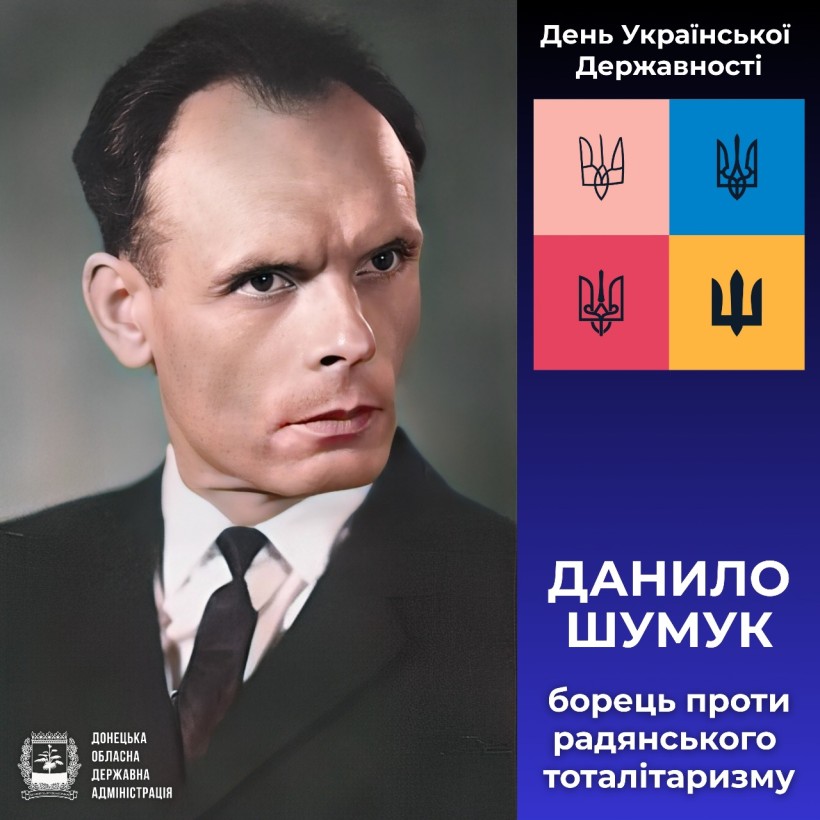
On July 15, Ukraine celebrates the Day of Ukrainian Statehood.
Ukrainian Statehood is the invisible chain that connects the glorious history of Kyivan Rus, the Galician-Volhynian principality, the Ukrainian Cossack state, the Ukrainian People's Republic, the West Ukrainian People's Republic, and modern independent Ukraine. Ukrainian Statehood is not only laws and the apparatus of governance; it is the millennia-long history of a multi-million people, of dozens of generations with their native language, customs, traditions, and culture. Ukrainian Statehood is hundreds, thousands, millions of people who day by day formed, fought for, defended, and passed on to their descendants the values that today unite us as the Ukrainian people.
On the occasion of the Day of Ukrainian Statehood, the Donetsk Regional State Administration publishes a series of stories about outstanding figures from Donetsk region – fighters for the idea of Ukrainian statehood and the independence of Ukraine.
“To fight for the freedom, justice, and independence of one's people and to bravely endure all suffering for that idea is not heroism, but a duty of every self-respecting person,” wrote Danilo Shumuk once. In fact, these words fully describe Danilo Lavrentiyovych himself. For his views, he spent 42 years, 6 months, and 23 days imprisoned in Polish, Nazi, and Soviet prisons and camps.
The fighter for Ukraine's freedom was born on December 30, 1914, in the village of Boremschyna in the Volyn region, in a peasant family. Under the influence of propaganda, young Danilo joined the communist underground, for which he was arrested five times by Polish law enforcement. However, in 1941, he was arrested by the Soviet authorities as a "brother of the enemy of the people." From prison, he was drafted into the army, where he participated in battles against the Wehrmacht, but was captured, from which he soon escaped and joined the ranks of the UPA.
In December 1944, Danilo Shumuk was arrested by NKVD officers. Initially, he was sentenced to death, but later the punishment was commuted to 20 years of hard labor in the Gulag. There, he became an active participant in the underground movement of political prisoners and took part in the Norilsk uprising of 1953.
In 1956, he was released early, but just two years later, Danilo Shumuk was sentenced again for agitation against the Soviet authorities. During his imprisonment, he befriended other dissidents and actively joined their struggle.
After his release in 1968, he moved to Kyiv, where he worked as a night watchman. But almost all his free time was spent writing his memoirs. In the same year, he wrote and distributed the article "To Dear Friends," which contained programmatic guidelines for the struggle of the "creative intelligentsia" against Soviet totalitarianism. He then printed and distributed his memoirs "Tales of What I Experienced" in samizdat. In Kyiv, Danilo Shumuk met Ivan Svitlychny, Yevhen Sverstiuk, Vasyl Stus, and became a participant in the non-violent dissident resistance movement. There, in 1971, he married Olena Yanovska.
In 1972, during mass searches and arrests of the sixtiers, printed parts of his memoirs were found. For them, Danilo Shumuk was sentenced to 10 years in camps of especially strict regime. Despite his deteriorating health, he constantly participated in various protests and hunger strikes. Exhausted to the limit, in 1978 he became a second-group invalid. In 1979, he joined the Ukrainian Helsinki Group and became a founding member in places of deprivation of liberty.
After completing his exile, on January 4, 1987, at the request of parliamentarians from Canada and the USA, Danilo Shumuk was allowed to travel to Toronto, Canada. Danilo Lavrentiyovych traveled to many cities in America, where he spoke before Ukrainian communities, politicians, and journalists. In 1987, he spoke in Washington and met with then-President Ronald Reagan. In 2002, he returned to Ukraine and settled in the city of Pokrovsk in Donetsk region, where at that time his daughter Vira lived.
Danilo Shumuk left us three important books of his memoirs for understanding Ukrainian history, which were initially published by the Ukrainian diaspora in the USA and Canada in the 1970s – 1990s: "Beyond the Eastern Horizon. Memories," "What I Experienced and Reflected. Memoirs and Reflections of a Ukrainian Dissident-Political Prisoner from the Years of Wandering and Struggle under Three Occupations of Ukraine (1921–1981)," and "From the Gulag – to the Free World."
The outstanding Ukrainian passed away on May 21, 2004. Posthumously, he was awarded the Order of "For Courage" of the I degree.